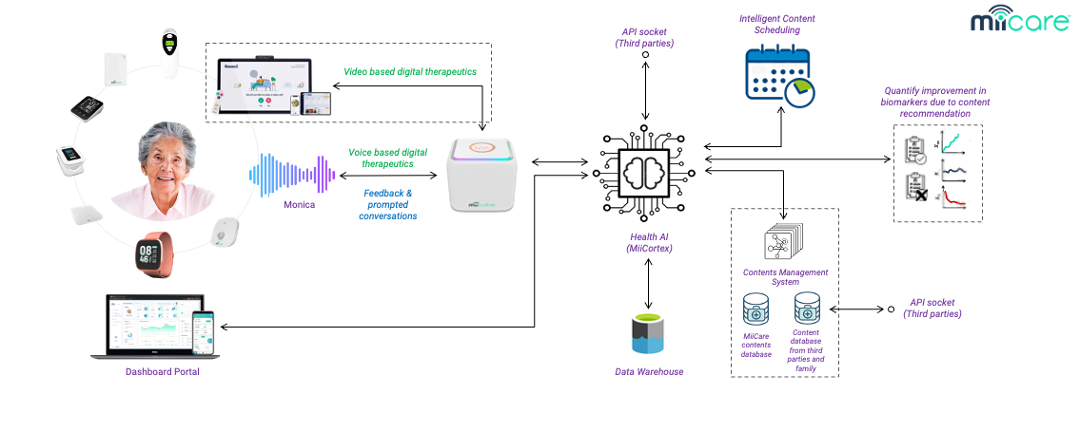Media Versus Dementia

British research (Potting Shed) has demonstrated that media can stimulate the brains of people with dementia. We aim to make suitable content (Walled Garden) easily available and affordable through an interface (Jukebox2025) driven by Artificial Intelligence which will personalise the media and halt, possibly reverse, the loss of cognition.
The wise men and (mainly) women in the Potting Shed (Science) breed new plants and study the effects.
Walled Garden, (Content) holds a variety of media selected and personalised to entertain and stimulate
Jukebox 2025, (Technology) provides dementia-friendly access to the contents of the Walled Garden.
The Walled Garden and Jukebox 2025 are based on psychological research which has established that external stimuli trigger long-term memories and improve the powers of conversation. Clinical research has to date failed to establish a pharmaceutical cure or prevention for dementia but now believes that interactive multimedia personalised to each user can halt cognitive decline and increase well-being at all stages of dementia.


Potting Shed - Science
Aims
- To review all existing research into the effects of external stimuli on people with dementia
- To conduct pilot studies involving people with dementia in domiciliary and in residential care, testing the effects of selected media at the different stages of the condition
- Continuously to monitor the behaviour and well-being of those who subscribe to the Walled Garden media.
It was now evident that observation of the behaviour of living PwD and the clinical analysis of brains of dead Alzheimer’s patients led to the same conclusions.
Professor Arlene Astell was the keynote speaker at the July seminar. Then in November, Professor Roxana Carare contacted MedvDem.
Michael’s observations of the effects of his wife’s deprivation of Stimulus by Media had led him to suggest an approach which was supported by the leading academics in the field.
The Team
Between them the scientists in our partnership have conducted psychological and clinical research into the effects of targeted media on people with dementia since the end of the last millennium.

Arlene Astell
Arlene Astell is a Professor of Neurocognitive Disorders with more than 20 years experience co-creating innovative solutions with people living with dementia. She is one of the inventors of CIRCA, an engaging interactive multimedia system that benefits cognition and quality of life. Since her PhD in 1995, Professor Astell has studied the psychological effects on behaviours of people with dementia of external stimuli. First at St Andrews, then at Sheffield and now at the University of Reading, she has observed that media can trigger long term memories thought lost, introduce topics of conversation and improve the well-being of people at all stages of dementia.
Roxana Carare
Professor Roxana Carare leads clinical research at Southampton's University Hospital into the physical effects on the brain of Alzheimer’s which has been commissioned by the pharmaceutical industry. She qualified in Medicine in Bucharest in 1994 and completed her PhD in neuropathology in 2006 at the University of Southampton. She has been internationally recognised for interdisciplinary research into drug delivery to the brain and to the causes and treatments for Alzheimer's disease, with over 120 peer-reviewed publications in the field. Roxana is a member of the UK Medical Research Council Dementia Platform UK Vascular Experimental Medicine committee and the UK government advisory committee for the effects of pollution on the brain, has served as the only European member of the American NIH strategy committee for funding in dementia. Roxana has won prestigious awards, including Dementia Research Leader from Alzheimer’s Society UK.

Watch this space
Coming soon....


The mighty music selector of the 1960s, the Jukebox, responded to the insertion of a coin and the press of a button by selecting the disk and playing the music. Using Artificial Intelligence, Jukebox 2025 will replace the complex buttons and keyboards of today’s content platforms, yet perform the tasks of identifying and authenticating the user, managing subscriptions, then help select and play content suited to their personal taste.
Jukebox 2025 - Technology
Jukebox 2025 will be a dementia-friendly interface, driven by machine learning/AI which tracks the interests and behaviours of each person with dementia, and matches them against a Walled Garden of personalised, interactive multi-media,[PIM]
Aims
- To make it as easy as possible for people with dementia to select, use and manage media which might stimulate their brains.
- To provide suppliers and copyright holders with the information and income to which they are entitled, whilst protecting the privacy of subscribers.
- to record data about the behaviours and well-being of users for use by authorised scientists to measure effectiveness of respective media.
At the Winchester seminar, the group discussed the challenge faced by people with dementia in tuning in and selecting content using remote controls and complex authentication procedures.
Today’s technologies offer the opportunity to offer people with dementia a much simpler interface with their TVs, radio or devices ….”
MedveDem has formed a partnership with Miicare whose digital health nurse, Monica, uses AI to monitor and support people with dementia
Jukebox 2025:
Digital, AI-led, version of the 1950s music machine which delivers:
- The menu - Access to the Walled Garden's library of multi-media
- Coin in the slot - from which the content owners are paid their share .
- Push-button - the Machine Learning has sufficient knowledge about the users to know what they might enjoy.
- Play - a range of formats compatible with the screen available to each user.
- Favourites - The Machine Learns which are the user’s favourite media and adds to this core collection.
- Feedback - Records the activities of each user and carer when online to media, to be fed back to researchers into the effects of media on dementia.
The App
The front end which links the output of the Jukebox with users, carers, families and researchers
The Team
The Jukebox team consists of partner company, miiCARE™, who is disrupting the way care is provided to the elderly people in the UK, keeping them safe, active, and connected to their families and other trustees.

Kelvin Summoogum
Kelvin Summoogum (CEO and Founder of MiiCare) is an HealthTech expert with 17 year experience delivering large digital transformation programmes for the NHS. He has been an advisor to NHS England on projects including PIONEER, VANGUARD, and Healthy New Towns. He is currently a doctoral researcher in AI applied in geriatrics and has a particular focus on digital pathways for dementia and frailty.

Debaayan Das
Debayan (Dexter) Das is currently the Interim Chief Data Officer of MiiCare. He is responsible for Data Infrastructure, development of clinical machine learning algorithms and undertaking applied research in the field of signal processing, machine hearing and acoustic based clinical gait analysis.

Sofie Blakstad
Sofie is founder and CEO of hiveonline, the first decentralised finance platform for African smallholder farmers; she is author of Fintech Revolution. She previously held senior roles in technology and business transformation in international banking including Lehman Bros, Citi, RBS, Nordea. She chairs the University of Edinburgh Futures Institute, and advises the UN and central banks on blockchain for sustainable development. Her company operates virtually, she lives in Copenhagen and has permanent teams in Stockholm and Kigali, Rwanda. Her work has been recognised by awards from: Cartier Women's Initiative, Vodafone Innovation for Women, PJ McGovern AI for Humanity, MIT Solve Digital Inclusion, Inclusive Fintech 50, Women's World Wide Web .. and more.

Dr Penelope Roberts
Dr Penelope Roberts OBE FInstP FIPEM FSRP has 25 years' experience of working in the NHS as a Medical,Physicist, culminating as Director of Medical Physics and Medical Engineering at Southampton University Hospitals. This was followed by nearly 20 years experience as a Radiation Metrologist working on international measurement standards at the Bureau international des poids et mesures (BIPM) based near Paris where she was appointed as the Director of Ionizing Radiation Metrology. She has over 100 peer-reviewed publications and has co-authored a text book for radiologists.
For the technically minded
MiiCARE had introduced AI into the way care is provided for people with dementia, keeping them safe, active, and connected to their families through its digital health coach Monica, an end-to-end AI-powered health monitoring system that uses an ecosystem of smart sensors to monitor the physical, physiological and psychosocial biomarkers of PwD, to recommend personalised interventions and to measure their effects.

JB25 will incorporate Monica’s delivery mechanisms (speakers, device, tv screens etc) which are available in the home of each PwD and relay instructions from and to the user via voice, finger-tip or other means with which they are familiar.
Our JB25 will deploy miiCARE’s Artificial Intelligence to track the behaviours and moods of PwD and connect them with PIM - affordable digital media - in the Walled Garden; it automatically detects and analyses the responses and moods of PwD and gives them access to and control of the media, responds to their requests, and feeds back their activities and requests. Our App/CMS will ensure that rights-holders are paid and users authenticated and their privacy protected; it will also provide feedback to help improve and match the content to each PwD and scientists to test the effects of media on the ever-increasing numbers of people suffering from pan dementia.


Walled Garden, a platform which holds a wide variety of media selected and where possible personalised to entertain and stimulate individuals with dementia. The content will, in some cases, spark memories which their family and carers did not know they still possessed. People with dementia will be able to choose, play and replay their favourites thanks to interfaces so simple that they are not noticed…
Walled Garden - Content
It is well established that some traditional media have the effect on people with dementia of triggering cognitive responses, long term memories thought lost, and stimulating conversation with carers and family, increasing well-being. High on the list of successful triggers are period footage and family memorabilia and especially music, from the years when the person was aged between 15 and 30years old, the so-called Reminiscence Bump.
There is still research to be done into the best formats in which to deliver these triggers, and we wish to research the types, lengths, settings and media to achieve results on different types and at different stages of dementia, We want in particular, to test the hypothesis that the greatest impact will be effected by a combination of Personalised Interactive Multimedia [PIM].
Aims
- Through a series of pilots involving people with dementia living at home and their carers, it is the aim of Media versus Dementia continuously to match the media to the stages and types of dementia and to analyse the effects they have on their users.
- To extend the period of independent living and delay the time when residential care is required.
- Continuously to widen the quantity and types of media and the stages of dementia to which they will benefit.
Over the past decade, a number of producers of different media have developed effective programmes designed to stimulate responses among PwD, and the BBC is making its Archive available to them
British scientists and designers have explored the potential for digital interactive media to occupy and involve PwD
At the Winchester seminar, the BBC’s Jake Berger suggested a channel dedicated to reminiscence content.
The Team

Jake Berger
Jake Berger is Executive Product Manager in the BBC’s Archive Content & Partnerships team, which created the award-winning BBC Reminiscence Archive in 2017, and BBC Music Memories in 2019. Jake has worked with numerous experts in the dementia and healthcare sector and is keen to ensure that the BBC’s archive can be used in future therapeutic and wellbeing initiatives. Jake is leading the BBC’s engagement with Media versus Dementia and attended the July seminar.

James Henderson
James is a filmmaker and designer from Eastleigh . Since graduating from Bournemouth University's Film Production and Cinematography course in 2018, James has primarily worked as a freelance videographer and editor, producing digital content and commercial material for a range of companies and projects across a broad range of sectors.
In 2026, we plan that the Walled Garden will be a digital platform containing a wide range of media suitable for people with dementia. It will not originate content but deliver to producers, through Jukebox 2025, access to subscribers for whom authentication, payments and safeguards have been digitally achieved, and whose tastes and condition are matched to the available content.
Media Memories
Many video and music companies currently produce personalised collections for individual PwDs, especially featuring music, movies, archive footage of events that they used to love in their 'REMINISCENCE BUMP' years (15- 30). These have been proved to be highly successful in achieving the results described in Potting Shed but producing media packages for individual users is very expensive and is usually grant-assisted,
MedveDem will use AI to gather media in the Walled Garden archive which matches the interests and reminiscences of each PD, but we want to explore ways in which new content can be created inexpensively using today's tablets, phones, zoom etc(as have all the videos in this website) in order to record interviews, relevant locations, etc. We also aim to find ways of editing and combining the media for each PwD - including quizzes, games etc and involvement via VR or videoconferencing enables them to participate with other PwDs or with choirs, discussion groups, actors in rehearsal etc.
The students will benefit from learning to work with vulnerable adults, and will learn the discipline required, to conform with agreed guidelines of ethics, safeguarding, data protection etc. The first products may be biopics of PwDs or collections of favourite music, archive footage of events from their younger year and activities designed to trigger memories thought lost and to delay their cognitive decline.
